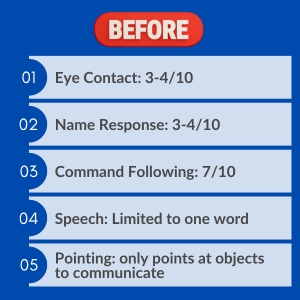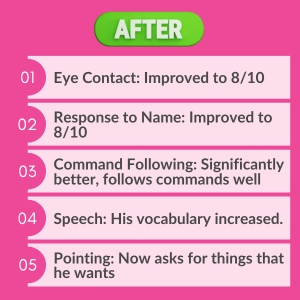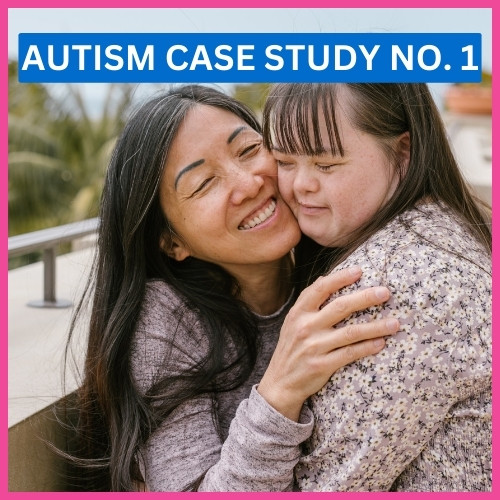Patient Profile
Name: Mast. S.
Age: 2.9 years
Gender: Male
Date of Initial Examination: January 12, 2023
Initial Presentation
A child aged 2.9 years came to the HomoeoCARE homeopathic clinic with complaints of lack of eye contact and possible secondary autism spectrum disorder (ASD). The main complaints were:
- Limited eye contact
- Poor name response
- Difficulty in following commands
His speech was restricted to single words, and he did not indicate stools or urine. Instead of using words, he pointed at objects to express his needs.
What Is Secondary Autism?
Secondary autism, also known as regressive autism, occurs when a child develops normally for the first 18 months and then starts to lose previously acquired skills, exhibiting signs of autism. This regression typically occurs in children between 15 and 30 months.
Sensory Symptoms
- Behavioral Symptoms:
- Lining up objects
- Staring at wheels
- Constantly making humming sounds
- Fearful of loud noises such as mixers and machines
- Behavioral Traits:
- Defiant and mischievous behavior
Follow-Up – February 1, 2023
Observations:
- Not following commands
- Looking at car wheels
- Increased jumping behavior
Homeopathic Treatment Started
Mast. S. was prescribed homeopathic medicine for autism based on his symptoms and overall condition. The treatment aimed to improve his:
- Communication skills
- Social interaction
- Behavioral problems
Progress Over One Year
After one year of homeopathic treatment for autism in Mumbai, the parents provided detailed feedback on Mast. S.’s progress.
Improvements:
- Eye Contact: Improved to 8/10
- Response to Name: Improved to 8/10
- Command Following: Significantly better, follows commands well
- Social Interaction: Greets guests, says “hello” and “namaste”
- Speech: Vocabulary increased; no longer points at objects but uses phrases like “Cook me food,” “Make me bread,” and “Make me wear such shoes”
- Behavior in School: Improved attention, participates in singing poems and rhymes, follows instructions properly, interacts well with teachers and friends
- Understanding and Comprehension: Reacts appropriately to warnings, shows empathy
- Behavioral Changes: Mischievous behavior reduced, responds better to instructions, follows discipline, is more friendly and responsive
Parent’s Observations
- Now stops at toy shops and asks for specific toys
- Shows an understanding of personal safety and warnings
- Increased social interactions with neighbors and friends
- Improved emotional responses, such as acknowledging pain and warnings from parents
Conclusion
The progress seen in Mast. S. after one year of homeopathic treatment highlights the potential benefits of this approach for children with secondary autism. Significant improvements in eye contact, name response, speech, and behavior have made a positive impact on his overall development.
Message to Parents
Homeopathy offers a ray of hope for children with autism. With consistent treatment and care, children can show remarkable improvements in their ability to interact and communicate effectively.


Conclusion
Mast. S. has shown a remarkable improvement in the various developmental areas over the past year of homeopathic treatment for Autism. His eye contact, name response, and command following have improved significantly. He has developed better speech capabilities and social interactions. The ongoing homeopathic treatment has positively impacted his behaviour, making him more responsive and socially engaged. This case study highlights the positive impact of early intervention in managing autism spectrum disorder, demonstrating Mast. S’s significant development over a year through homeopathic treatment.

